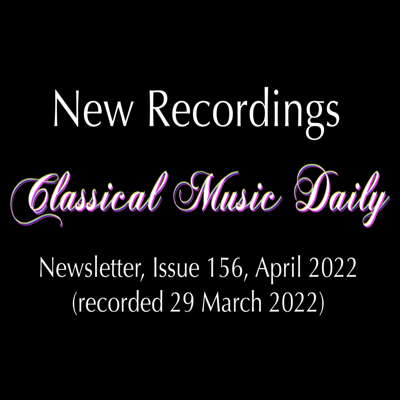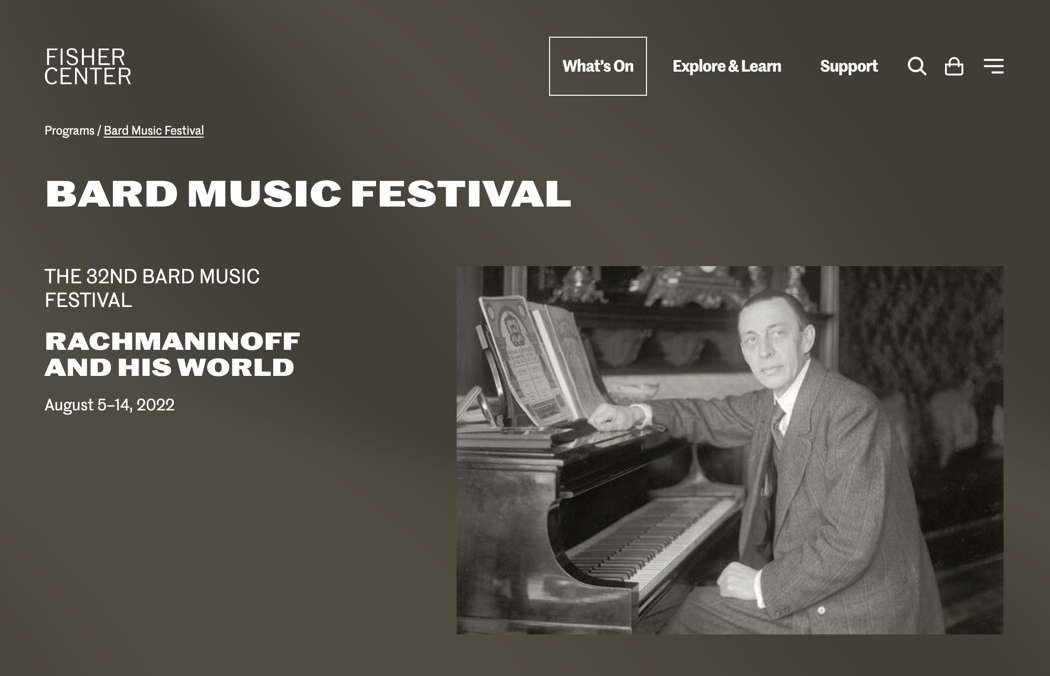 VIDEO PODCAST: New Recordings - Find out about Adrian Williams, Andriy Lehki, African Pianism, Heinrich Schütz and Walter Arlen, and meet Stephen Sutton of Divine Art Recordings, conductor Kenneth Woods, composer Graham Williams and others.
VIDEO PODCAST: New Recordings - Find out about Adrian Williams, Andriy Lehki, African Pianism, Heinrich Schütz and Walter Arlen, and meet Stephen Sutton of Divine Art Recordings, conductor Kenneth Woods, composer Graham Williams and others.
- Miami Beach
- Pablo Casals
- Antarctica
- Johann Strauss the Son
- Michael Landes
- Martin Wesley-Smith
- Russell Hepplewhite: Song Of Flight
- David Charles Abell
 DISCUSSION: What is a work? John Dante Prevedini leads a discussion about The performing artist as co-creator, including contributions from Halida Dinova, Yekaterina Lebedeva, Béla Hartmann, David Arditti and Stephen Francis Vasta.
DISCUSSION: What is a work? John Dante Prevedini leads a discussion about The performing artist as co-creator, including contributions from Halida Dinova, Yekaterina Lebedeva, Béla Hartmann, David Arditti and Stephen Francis Vasta.
Bard Music Festival
Bard Music Festival, beginning 5 August 2022, explores the life and times of one of the last great romantics in 'Rachmaninoff and His World'
On Friday 5 August 2022 the Bard Music Festival returns with an intensive two-week exploration of 'Rachmaninoff and His World'. In twelve themed concert programs, the festival's thirty-second season examines Sergei Rachmaninoff (1873-1943), perhaps the last great exponent of Russian Romanticism, tracing the complex course he navigated between Russia and Modernity (Weekend One: Aug 5-7), and investigating his relationship with the New Worlds he went on to conquer (Weekend Two: Aug 12-14). Enriched by the music of Rachmaninoff's compatriots, contemporaries, fellow pianist-composers, American influences and more, all events take place in the stunning Frank Gehry-designed Fisher Center for the Performing Arts and other venues on Bard College's Hudson River campus. New Yorkers can take round-trip bus transportation to Programs 6 and 12 (see details below), and home audiences around the world can enjoy Programs 1, 3, 6, 7, 9 and 12 when they stream live on the Fisher Center website. Anchoring Bard SummerScape as in previous seasons, the Bard Music Festival once again promises to be 'the summer's most stimulating music festival' (Los Angeles Times).

Online publicity for the 2022 Bard Music Festival
Festival founder and co-artistic director Leon Botstein is music director of both the American Symphony Orchestra (ASO) and The Orchestra Now (TŌN), Bard's unique graduate training orchestra. His festival appearances with the ASO include an all-Rachmaninoff event pairing the composer's posthumously rediscovered First Symphony, celebrated for its melodic invention, thematic cohesion and rich orchestral color, with his last one-act opera, The Miserly Knight. Featuring vocal soloists Nathan Berg, Limmie Pulliam, Rodell Rosel and Ethan Vincent under Jordan Fein's direction, Bard's semi-staged production of the Pushkin adaptation marks a bona fide rarity (Program 6). Botstein's TŌN performances include accounts of Rachmaninoff's Isle of the Dead, a symphonic poem inspired by Swiss symbolist painter Arnold Böcklin (Program 1), and of Henry Cowell's avant-garde theater piece Atlantis (Program 9), which received its long overdue New York premiere under Botstein's leadership in 2020. This will be heard alongside other examples of the extraordinarily diverse array of musical styles and approaches on offer in 1930, from Webern's Symphony, a modernist poetic miniature, to Ferde Grofé's tone poem Grand Canyon Suite, a one-time audience favorite; the Suite from Shostakovich's satirical, politically charged ballet, The Golden Age; and Respighi's orchestral transcriptions of Rachmaninoff's Études-tableaux (Program 9).
Rachmaninoff was one of classical music's preeminent pianist-composers, and the piano figures prominently in this year's festival. A top prizewinner at the 2021 Sydney International Piano Competition, Ukrainian pianist Artem Yasynskyy joins TŌN as soloist in the composer's virtuosic Rhapsody on a Theme of Paganini (Program 1); celebrated Rachmaninoff interpreter Zlata Chochieva undertakes the composer's accomplished but seldom-performed Fourth Piano Concerto (Program 9); and Danny Driver joins the ASO for Rachmaninoff's Second Piano Concerto (Program 3), arguably the best-loved example of the genre in the canon. This is juxtaposed with Busoni's Piano Concerto (Program 3), a monumental rarity for vast forces that was previously championed by Botstein and the ASO at Carnegie Hall. There, as now, their soloist was Piers Lane, who brought 'drive, athleticism and muscularity, certainly, but also lyricism and shapeliness' (New York Times) to Busoni's fiendishly challenging score.
Andrey Gugnin joins the Viano String Quartet for the Piano Quintet by Rachmaninoff's teacher Anton Arensky (Program 2), and peerless collaborative pianist Brian Zeger for that of the composer's great friend and colleague Nikolai Medtner (Program 5). Solo piano highlights include Yasynskyy's accounts of Rachmaninoff's perennially popular C-sharp minor Prelude (Program 1) and the beautifully crafted, single-movement Third Piano Sonata by Prokofiev (Program 5); and Lane's interpretation of Rachmaninoff's masterful Variations on a Theme of Chopin, heard on a wide-ranging program that sheds light on the grueling touring careers of virtuoso pianists (Program 8). Driver and Lane join forces for the composer's little-known two-piano arrangement of his own Symphonic Dances, which synthesize nostalgia for Rachmaninoff's Russian roots with the sounds of Cole Porter, Duke Ellington and other contemporary Americans, whose music may be heard at the same event (Program 7).
Besides anchoring piano quintets by two of his Russian contemporaries, the Viano String Quartet - first prizewinner at the Banff International Quartet Competition - performs Rachmaninoff's own little-known Second String Quartet (Program 1). Sphinx Competition-winner Gabriel Martins is the cellist in the composer's superlative Cello Sonata (Program 5), Chinese violinist Luosha Fang plays Nikolay Myaskovsky's Violin Sonata in F (Program 11), and two-time Grammy-nominated violinist Jesse Mills takes part in the A-minor Sonata for Violin and Piano by Rachmaninoff's teacher Sergei Taneyev, whose profile Bard has already done much to raise (Program 2).
Italian American soprano Alexis Seminario, mezzo-soprano Rebecca Ringle Kamarei, tenor William Ferguson and baritone Tyler Duncan interpret songs by Rachmaninoff, Medtner and Prokofiev in 'Rachmaninoff and the Female Muse', a concert with commentary by Scholar-in-Residence Philip Ross Bullock (Program 4). Other vocal highlights include performances of songs by Rachmaninoff (Program 1) and Florence Price (Program 11) by Armenian soprano Mané Galoyan, second prizewinner at the 2021 Operalia.
As in previous seasons, all choral works showcase the Bard Festival Chorale and James Bagwell. Hailed as 'one of the high points of every Bard Festival' (New York Arts), this season's annual choral program presents Rachmaninoff's All-Night Vigil, a spiritual work in the Russian Orthodox tradition whose resonant a cappella sonorities use the full range of the human voice (Program 10). To conclude the festival, Bagwell and the choir join Botstein and TŌN for a pair of grand-scale choral symphonies: the Wagnerian, six-movement First Symphony by Rachmaninoff's classmate Scriabin, and The Bells, the apocalyptic yet ultimately uplifting piece that was Rachmaninoff's favorite of his own works (Program 12).
Further information: fishercenter.bard.edu/bmf
Posted 8 July 2022 by Mark Primoff



